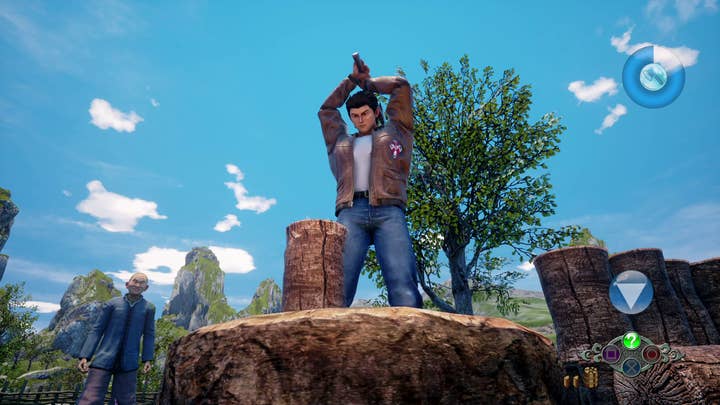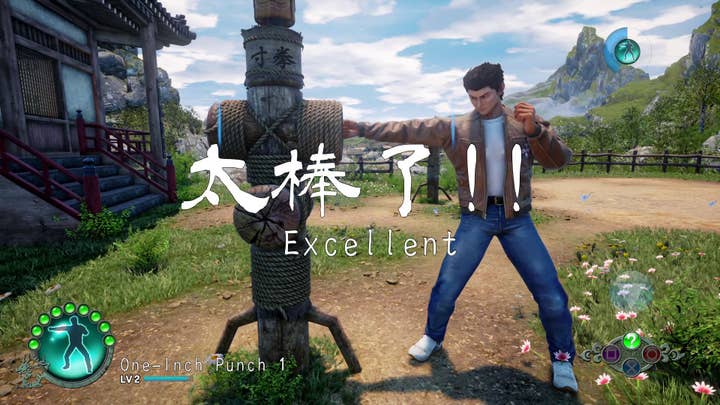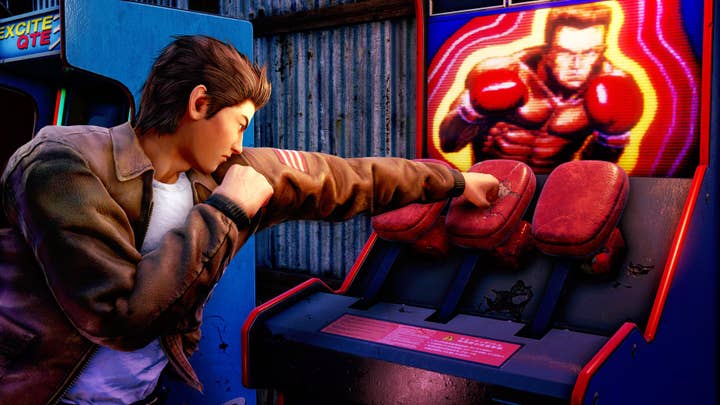Shenmue III: Critical Consensus
The 18 year wait for a new Shenmue is over, and critics are split over a game deliberately out of step with the times
Look around and you won't find too many reviews for Shenmue III. This game has been brewing in the mind of the venerable Yu Suzuki in some form or another for the last 18 years, and yet its Metacritic page remains sparsely populated for a product that launched almost two weeks ago. The term "long-awaited" could have been invented just for Shenmue III -- so where is everybody?
Metacritic has a few clues that may offer an answer. Death Stranding, which launched the week before, has 99 reviews for its PlayStation 4 version. Need for Speed: Heat, which was also released on November 8, has 53 critics contributing to its score. Look at November 15, just four days before Shenmue III hit the market, and the landscape is busier still; Star Wars Jedi: Fallen Order has 51 reviews, while the Switch exclusive Pokémon Sword and Shield reached 49.
By contrast, Shenmue III's Metacritic average was sourced from just 20 critics. Despite the best part of two entire decades elapsing since Shenmue II, the games press evidently couldn't find time with so much else competing for their attention. It is still too early to tell, but publisher Deep Silver may come to regret picking a release window so crowded with AAA blockbusters.
"A hyper-real Animal Crossing more than a GTA, really, with a rhythm that's soothingly sedate"
Eurogamer
Then again, maybe not. While reviews can be invaluable in creating word-of-mouth buzz, Shenmue III's average score of 70 encapsulates a general mood in which even the recommendations are laden with caveats. Take Eurogamer's review, one of the most positive currently available, but one that describes Shenmue III as "archaic and arcane," and "completely ignorant of modern trends in open world gaming, or indeed trends of the last 20 years."
This is a common sentiment across all of Shenmue III's reviews, both positive and negative. Ys Net hasn't rebooted or reimagined its franchise; rather, it has made a game as if (for the most part) the intervening years never happened at all. For some critics, this is taken as some kind of failure. For others, it is a veteran developer delivering exactly what his audience wants to see.
Eurogamer's Martin Robinson considers it to be the latter, but he also has unreserved praise for the depth and detail of the world-building. Open worlds are now much larger than those in Shenmue III, but few have ever been so detailed.

"The pastoral haze of Bailu, the density of Niawou and further beyond are told with breathtaking fidelity," Robinson writes. "Some of that detail is enjoyably pointless... and it conspires for a world that feels very alive.
"Villagers run their own routines as the clock winds on, each with their own stories, their own faces and their own names... It's a game that has you running in circles, but one that rewards the repetition too as you check in on people and learn more of their story and character and maybe even run errands for them; a hyper-real Animal Crossing more than a GTA, really, with a rhythm that's soothingly sedate."
GamesRadar+ draws similar conclusions to Eurogamer, and offers its qualified praise -- the gameplay, it proclaims, "is just very mundane" -- at a similar pitch. But Justin Towell argues that it isn't just that Shenmue III is so detailed; it's that those details form a more cohesive experience than even its two predecessors.
"The best way to continue to move ahead is to check literally every single possible option for information, which is quite the chore"
Polygon
"You can fish, collect capsule toys, play in arcades... and gamble tokens on several basic minigames. But where the old Shenmue's capsule toys meant nothing and money were [sic] hardly used, now everything has a purpose and is interlinked.
"Capsule toys come in sets, and sets can be sold at pawn shops or traded for skill books. These teach you martial arts moves, which must be practiced and mastered at a dojo. Levelling up your Kung Fu works better when your vitality is full, so you need to buy food. You earn money by chopping wood, catching ducks or fishing, but the gambling system uses a separate currency: tokens. Tokens win prizes, prizes can be sold for money, money buys you moves.
"So basically all the mundane, apparently extraneous stuff is all channelled back into Ryo's journey towards Kung Fu mastery. It's never been so cohesive and it's brilliantly done."
Perhaps the most striking thing about Shenmue III is the fact that it apparently succeeds at its goals, and yet in doing so has attracted a great many tepid or negative reviews. Polygon's Laura Dale states that it is "exactly what I expected it to be, based on the original two games in the series." But in staying so faithful to that once groundbreaking formula, it principally serves as a reminder of "just how far games have come since [then]."
"Investigations involve talking to basically every person I see until someone happens to know the information needed to proceed, which gives the entire experience the feel of a wild goose chase," Dale says. "You're basically just running up to strangers, telling them your dad was murdered, asking them about vaguely described criminals, and moving on to the next possible lead. The trick is just to go everywhere, and talk to everyone, until I find a crime scene.

"But crime scenes are no less methodical, and they're certainly no more enjoyable. I'm usually stuck in a room with dozens of interactive objects to slowly open, look through, and close again, searching for clues. It's hard to know where to start, but it doesn't seem to matter. The best way to continue to move ahead is to check literally every single possible option for information, which is quite the chore."
The goal of the first Shenmue, Dale argues, was to "show players what happened between the exciting parts of most action or role-playing games, and the slow pace was part of the point." That was a powerful idea at the time, an idea that inspired the kind of devotion that can set Kickstarter ablaze 15 years down the line. According to Dale, though, while Shenmue 3 aims for (and occasionally reaches) "contemplative," it more often lands on "drudgery."
"The whole project has this odd glaze to it, as you really shouldn't be diving into this game without having played and enjoyed the first two"
Destructoid
When reading Shenmue III's reviews, it's impossible to escape the impression that both its admirers and its detractors are saying much the same thing -- and whether you actually enjoy the experience largely depends on how your individual tastes are calibrated. However, there are some objective problems with the game, as VG247's Kirk McKeand notes, some of which are tied to a clear lack of resources for a game of this scope and ambition.
Shenmue III, McKeand says, "is not a triple-A game. It has a much lower budget than all of the big releases this year, and that's immediately apparent in the weird camera cuts, the acting, and the graphics. Every single actor delivers their lines with the gusto of a teenager who's been forced to clean their room, and the dialogue doesn't help."
There are also myriad little annoyances in the game's design, which seem to woozily walk the line between idiosyncratic flourish and poor conception.
"For one, if you attempt to pause a job or activity by, you know, pressing the pause button, you will skip the job," McKeand says as one of several examples. "You can't skip repeating dialogue, but you can accidentally skip a day's work, which is good, in the same way catching your ring on a door handle is good."
Despite this, though, McKeand (like many other critics) enjoyed the time he spent with Shenmue III -- enough, at least, to award the game three out of five stars, which is the kind of score not often bestowed on games with as many niggles and issues as this one. Is that down to lingering nostalgia for the original games? The will to reward Suzuki for never giving up on his dream? Or simply the ability to adapt to the strange, glacial rhythms to which Shenmue's gameplay moves?
It is, perhaps, all three working in concert, beguiling some players even as it repels others. That may be enough to satisfy the dwindling group of people who have sincerely been waiting all this time, but there is legitimate doubt as to whether it will tempt anybody else. If so, that may put Shenmue 4 beyond Suzuki's grasp.
"I think a lot of people are going to bail on Shenmue III already, and you'd be wise to do so," Destructoid's Chris Carter says in his review. "In fact the whole project has this sort of odd glaze to it, as you really shouldn't be diving into this weird, heady game without having played and enjoyed the first two.
Carter concludes: "I was torn writing this review as I went back and forth multiple times on whether or not Shenmue III's adherence to the past was worth the squeeze. In spurts, it's not. But as I walked back to Shenhua's cottage to turn in for the night after a hard day's work, earning back the money I had gambled away, it hit me: people just aren't making many games like this anymore. We may never even get something like this again if Shenmue IV isn't greenlit, which would be a shame."

